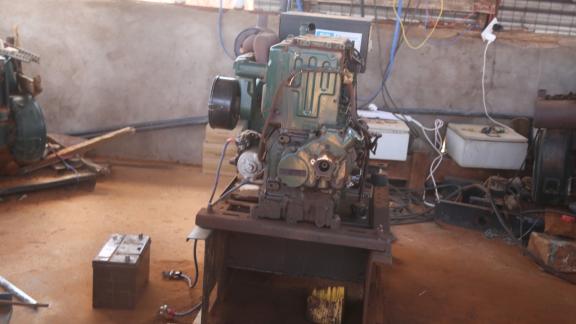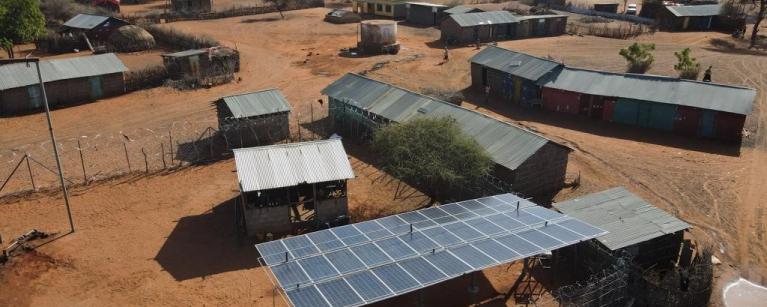
The old water pumping engine in Kabo Village.
The residents of Kabo village located in Lafey Sub-County, Mandera County, Kenya have for years faced significant challenges in accessing safe drinking water for domestic and livestock use. This was mainly due to the frequent breakdowns of the diesel-powered water pumping system that was used to pump water from the village borehole. The frequent breakages were associated with the high cost of repair and maintenance.
Located in a county plagued by cyclic events of drought, the women, and girls of Kabo Village, were forced to endure long and strenuous journeys of up to 12km to the neighbouring villages in search of water for domestic use. The long walks along insecure paths exposed them to risks of gender-based violence and exploitation. The long hours spent looking for water meant that women were not able to attend to other productive duties while girls' access to education was compromised. In addition to this, was the heightened risk of accessing contaminated water which would contribute to the spread of waterborne diseases such as cholera and acute watery diarrhoea.
Kabo Says Goodbye to Dependence on Diesel-Powered Water Pumping and Embraces Solar-Powered Water Pumping
To address the challenges of accessing safe water for the over 798 households living in Kabo Village, Nomadic Assistance for Peace and Development (NAPAD) in partnership with Oxfam installed a hybrid solar-powered water pumping system at the Kabo Borehole. The investment has ensured that renewable safe and affordable energy is utilised most of the time to pump water from the village borehole to the water storage tank from where the community collects the water. Over 3900 persons in the village now have access to a safe water supply closer to them.
“With the installation of the solar system, we no longer have to worry about diesel engine failures or the high cost of diesel. The water supply is now continuous and uninterrupted." Reported a Kabo Village resident.
To ensure that the hybrid solar-powered water pumping system is well maintained and operated, NAPAD trained three local community members on its operation and maintenance. This ensures that the community takes ownership of the system and ensures its long-term functionality. To ensure proper management and sustainability of the water supply system, a small fee of Ksh 2.50 (include in USD/Euro) per jerrycan of water is charged to the households. This income collected is managed by the water committee and is used to finance the water system maintenance beyond the project period, ensuring its sustainable use.
In an effort to bring down the incidences of water borne diseases, NAPAD also facilitated community hygiene and sanitation promotion among the households in Kabo village conducted by Community Hygiene Promoters (CHPs). The CHPs engaged with households in the village, educating them on the importance of maintaining good household hygiene and proper water handling. They also engaged the community to foster a shared responsibility for improving hygiene practices and reducing the prevalence of waterborne diseases caused by the use of contaminated water.
Mr Suleiman Sheikh, Kabo Village Chief, witnessed the official handing over of the Solar Powered system to the Mandera County Department of Water services at an event also attended by representatives from the County Water Department, the Sub-County administration, and the village elders.
“We are very thankful to NAPAD and her partners for bringing this project to our village, this borehole is not only meant for us, but for generations to come” Suleiman Sheikh, the Kabo Village Chief, expressed his gratitude during the project handing over ceremony
““We are very thankful to NAPAD and her partners for bringing this project to our village, this borehole is not only meant for us, but for generations to come””
